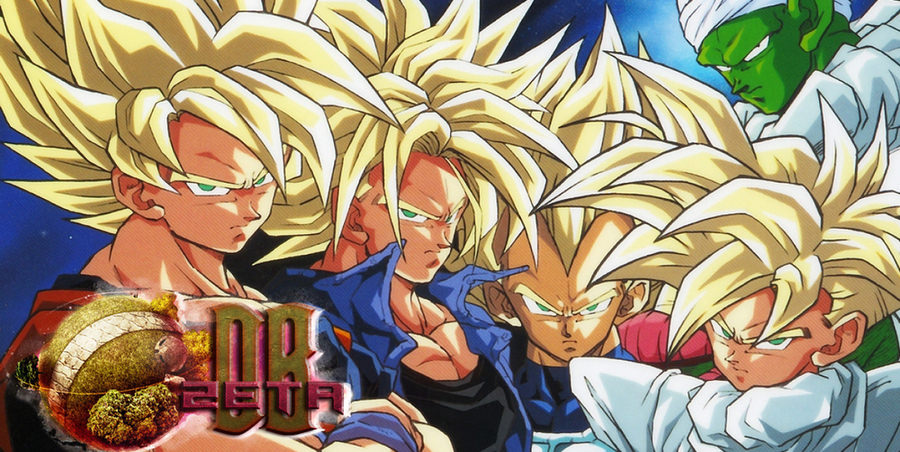- Joined
- Feb 23, 2023
- Messages
- 887
- Age
- 125
Katakana: 魔人ブウ
Hepburn: Majinbū
Shuiesha: Majin-Boo
Toei: Majin-Boo
Bandai: Majin-Boo
Funimation: Majin Buu
Viz: Majin Boo (formerly "Djinn Boo")
The official romanization in Japan is pretty much always "Majin-Boo". Funimation went with "Majin Buu". Viz used to call him "Djinn Boo", but they switched to "Majin Boo" in 2015.
The character is or is at least based on a genie according to Toriyama. His antenna resembles a genie's ponytail, his clothes are genie-esque, he forms from smoke, and he has magical powers. He's also listed under "genies & monsters" in the Chozenshuu. In Japan, genies are often called 魔人 (majin), which literally translates to "magic(al) being/person" or "demon(ic) being/person". Given the genie inspiration, "magic(al) being/person" would be a more accurate reading.
Due to Funimation, most people spell his name as "Buu", which comes from the Hepburn for ブウ (Bū). However, his name comes from the Cinderella song "Bibbidi-Bobbidi-Boo". ブウ (Bū) is merely a Japanese approximation for "Boo" in katakana; it would actually normally be spelled as ブー (Bū), but ブウ (Bū) amounts to the same thing. Note that Toriyama spelled his name as "Boo" in the manga. ビビディ(Bibidi) is "Bibbidi", バビディ(Babidi) is "Bobbidi", and ブウ (Bū) is "Boo".
(Admittedly, though, the ブウ (Bū) spelling is pretty distinct to the character in Japan despite being pronounced exactly like ブー (Bū). If one wants to use a different spelling than "Boo" to reflect how ブウ (Bū) is a different spelling from ブー (Bū), that's fine)
"Genie" is an anglicization of "jinni" and "djinni", a romanization of the Arabic term for a genie. Technically, Viz calling him "Djinn Boo" was incorrect because the word "djinn" is plural for "djinni"; as Boo is only a single genie, Viz should have called him "Djinni Boo".
I'm not against calling Boo a "genie", "jinni", or "djinni" but I would prefer a more direct translation of the kanji. 魔人 (majin) doesn't directly translate to "genie"; it makes sense to call Boo that in context, but I would prefer to call him "Magic Being Boo" or "Magic Person Boo". lol but that's a bit too long, so I would prefer to just call him "Magic Boo" for short. I always liked how that sounds similar to "Majin Buu" while also being a valid translation of the katakana. I figure, since you can translate サイヤ人 as "Saiya", dropping the 人 (jin), why not translate 魔人 (majin) as "magic", dropping the 人 (jin)? It's just for short, anyway. When discussing his species in general, I would say "magic(al) beings/people".
For the record, ネコマジン (Nekomajin) technically should probably just be "Nekomajin" as it's only katakana, emphasizing on the syllables you say rather than the actual meaning. I'm not against translating that as "magic(al) cat", though.
tl;dr His name is "Magic(al) Being/Person Boo/Buu". I'd call him "Magic Boo", though.
Hepburn: Majinbū
Shuiesha: Majin-Boo
Toei: Majin-Boo
Bandai: Majin-Boo
Funimation: Majin Buu
Viz: Majin Boo (formerly "Djinn Boo")
The official romanization in Japan is pretty much always "Majin-Boo". Funimation went with "Majin Buu". Viz used to call him "Djinn Boo", but they switched to "Majin Boo" in 2015.
The character is or is at least based on a genie according to Toriyama. His antenna resembles a genie's ponytail, his clothes are genie-esque, he forms from smoke, and he has magical powers. He's also listed under "genies & monsters" in the Chozenshuu. In Japan, genies are often called 魔人 (majin), which literally translates to "magic(al) being/person" or "demon(ic) being/person". Given the genie inspiration, "magic(al) being/person" would be a more accurate reading.
Due to Funimation, most people spell his name as "Buu", which comes from the Hepburn for ブウ (Bū). However, his name comes from the Cinderella song "Bibbidi-Bobbidi-Boo". ブウ (Bū) is merely a Japanese approximation for "Boo" in katakana; it would actually normally be spelled as ブー (Bū), but ブウ (Bū) amounts to the same thing. Note that Toriyama spelled his name as "Boo" in the manga. ビビディ(Bibidi) is "Bibbidi", バビディ(Babidi) is "Bobbidi", and ブウ (Bū) is "Boo".
(Admittedly, though, the ブウ (Bū) spelling is pretty distinct to the character in Japan despite being pronounced exactly like ブー (Bū). If one wants to use a different spelling than "Boo" to reflect how ブウ (Bū) is a different spelling from ブー (Bū), that's fine)
"Genie" is an anglicization of "jinni" and "djinni", a romanization of the Arabic term for a genie. Technically, Viz calling him "Djinn Boo" was incorrect because the word "djinn" is plural for "djinni"; as Boo is only a single genie, Viz should have called him "Djinni Boo".
I'm not against calling Boo a "genie", "jinni", or "djinni" but I would prefer a more direct translation of the kanji. 魔人 (majin) doesn't directly translate to "genie"; it makes sense to call Boo that in context, but I would prefer to call him "Magic Being Boo" or "Magic Person Boo". lol but that's a bit too long, so I would prefer to just call him "Magic Boo" for short. I always liked how that sounds similar to "Majin Buu" while also being a valid translation of the katakana. I figure, since you can translate サイヤ人 as "Saiya", dropping the 人 (jin), why not translate 魔人 (majin) as "magic", dropping the 人 (jin)? It's just for short, anyway. When discussing his species in general, I would say "magic(al) beings/people".
For the record, ネコマジン (Nekomajin) technically should probably just be "Nekomajin" as it's only katakana, emphasizing on the syllables you say rather than the actual meaning. I'm not against translating that as "magic(al) cat", though.
tl;dr His name is "Magic(al) Being/Person Boo/Buu". I'd call him "Magic Boo", though.
Last edited:
